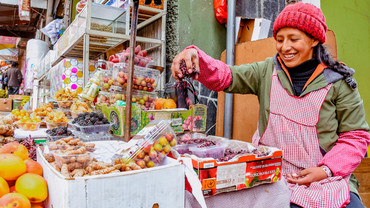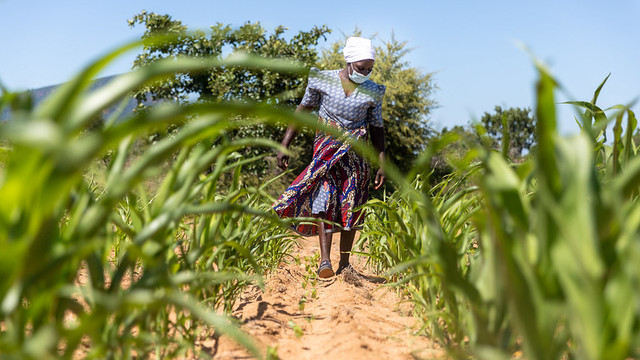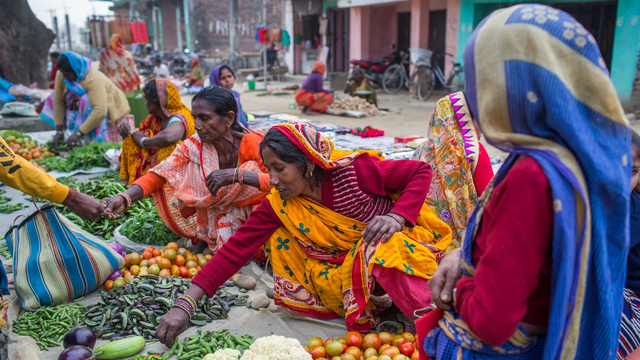Nourishing diversity in our food systems
Although our food systems seemingly deliver impressive abundance and variety, we are losing crucial agricultural biodiversity and our increasingly homogenised diets are leading to disease and obesity. Seth Cook sets out five steps for better, more diverse food systems.


A supermarket is Peru offers a bewildering selection of potatoes to its customers. But many countries face hunger and malnutrition despite increased food production (Photo: Teresa Stanton, Creative Commons, via Flickr)
On the surface at least, modern foods systems appear to be astonishingly diverse. A person walking into a supermarket almost anywhere in the world can be overwhelmed by the profusion of choices.
The productivity of our food systems is also impressive: between 1961 and 2001, crop yields more than doubled in all regions of the developing world except Africa.
But this abundance and variety are deceptive. Hunger and malnutrition persist in many countries in spite of increased food production.
A few ingredients such as refined flour, sugar, soy, palm oil and high fructose corn syrup appear over and over again in a huge range of different products. What seems like variety is actually just endless re-engineering, re-combining and repackaging of the same basic, highly processed ingredients.
Meanwhile, rising consumption of ultra-processed foods such as fizzy drinks, crisps, energy bars and sweets are contributing towards a global epidemic of overweight and obesity, as well as diet-related non-communicable diseases such as cancer, diabetes and heart disease.
The world at risk
At the same time, the world's rich agricultural biodiversity is at risk, and with it the resilience of our food systems. Agricultural landscapes are becoming increasingly simplified as the number of crops, crop varieties and animal breeds grown on farms declines.
The loss of agricultural biodiversity coincides with a trend towards the homogenisation of diets. A mere 30 crops supply 95 per cent of the calories that people obtain from food, and only four crops – maize, rice, wheat and potatoes – supply over 60 per cent (PDF).
Such heavy reliance on a narrow range of crops, crop varieties and animal breeds brings long-term increasing risks for agricultural production, for livelihoods, and for nutrition. It also undermines the ability of agriculture to adapt to climate change.
What can be done?
Citizens currently have little input into food systems apart from their consumption choices. Key policy decisions are often disconnected from the interests of both producers and consumers. How can we reorient food systems towards greater diversity, health, sustainability and inclusiveness?
A key opportunity is to look at how diverse agricultural production and diverse diets can be mutually reinforcing. Given that consumer demand and purchasing power shape the incentives that farmers have to maintain a diverse array of crops, promoting diverse diets helps to conserve agricultural biodiversity and support rural development. At the same time, diverse agricultural production can make a wide variety of foods available to consumers.
 Informal food systems play a vital role in fostering diversity in food production and consumption in many developing countries, and are often the cheapest and most accessible source of food for low income consumers. Rather than attempting to restrict or eliminate informal food markets, governments should allow them to thrive and find ways to work closely with food vendors.
Informal food systems play a vital role in fostering diversity in food production and consumption in many developing countries, and are often the cheapest and most accessible source of food for low income consumers. Rather than attempting to restrict or eliminate informal food markets, governments should allow them to thrive and find ways to work closely with food vendors.
We also need multi-stakeholder approaches that can ensure that the voices of all relevant groups are heard – particularly those marginalised groups such as smallholder farmers and women who play a critical role in safeguarding agrobiodiversity and diverse diets.
Food Change Labs are one proven approach for bringing all the relevant stakeholders together to jointly analyse problems and come up with innovative solutions acceptable to all parties. Dutch NGO Hivos and IIED have been working with local partners to convene Food Change Labs in Indonesia, Uganda, Zambia and Bolivia.
By building upon citizens' knowledge and practices, Food Change Labs and similar approaches can help to reshape food systems towards greater diversity, health, inclusiveness and sustainability.

Five steps towards more diverse food systems
As a result of our work, Hivos and IIED have identified five steps that can help to promote diversity in food systems (PDF):
- Reorient food and agricultural policies to encourage diversity, nutrition, sustainability and affordability, rather than only prioritising a small number of staple crops
- Use markets to support diversity in production and consumption by allowing informal markets to thrive, using procurement, and investing in innovative agri-food SMEs that promote diversity
- Promote and maintain local crop varieties, animal breeds and under-utilised crops by developing markets for them, adjusting extension services and fostering synergies between scientific and local knowledge
- Nurture the biocultural heritage and traditional knowledge that underpin much of the world's remaining agricultural biodiversity, including by protecting the rights of women, and
- Increase awareness and catalyse change through innovative multi-stakeholder approaches like food labs, that explicitly bring in the voices and perceptions of farmers and consumers, including women and young people.
Food Change Labs and other work described above are part of the 'Sustainable diets for all' programme, which builds capacity among local civil society organisations in Uganda, Indonesia, Bolivia and Zambia to advocate for sustainable, diverse and healthy diets.
Seth Cook (seth.cook@iied.org) is senior researcher in IIED's Natural Resources research group.
- Cook will be talking about diversity from farm to fork and presenting a policy briefing at the 44th plenary session of the United Nations' Committee on World Food Security (CFS) in Rome this week. Side event #13, 'Multi-stakeholder action to promote food diversity from farm to plate', takes place on Tuesday, 10 October, from 6-7.30pm in the Iran Room, building B, floor 1.




